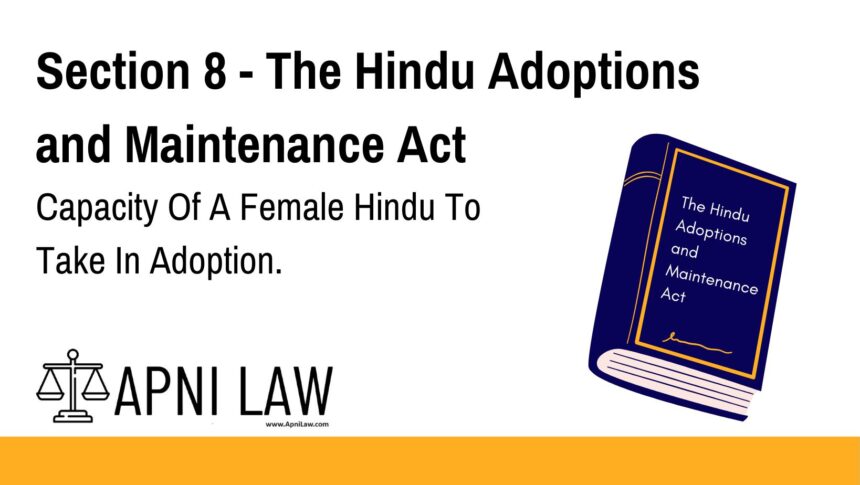Code: Section 8 – Capacity of a Female Hindu to Take in Adoption
Any female Hindu who is of sound mind and is not a minor has the capacity to take a son or daughter in adoption:
Provided that, if she has a husband living, she shall not adopt a son or daughter except with the consent of her husband unless the husband has completely and finally renounced the world or has ceased to be a Hindu or has been declared by a court of competent jurisdiction to be of unsound mind.
Explanation of Section 8 – Legal Capacity of a Female Hindu to Adopt
Section 8 establishes the eligibility of a Hindu woman to adopt a child under Indian law. Much like the previous section governing male Hindus, this provision ensures that only competent women may initiate legal adoption—while also balancing marital consent.
Conditions for a Female Hindu to Adopt:
- She must be a Hindu by religion.
- She must be of sound mind.
- She must be an adult (i.e., not a minor).
- If she has a living husband, she needs his consent—unless specific exceptions apply.
Exceptions to Husband’s Consent:
- The husband has renounced the world entirely.
- The husband is no longer a Hindu.
- A competent court has declared the husband to be of unsound mind.
These exceptions allow the wife to adopt independently when the husband is not in a position to participate in legal decisions.
Illustration
Here are some examples to illustrate the application of Section 8:
- A 30-year-old married Hindu woman wants to adopt a daughter. She must get her husband’s consent unless one of the legal exceptions applies.
- A widow or a divorced woman does not need any consent. She has the full legal capacity to adopt, provided she meets the mental and age requirements.
- A married woman’s husband is declared mentally unfit by the court. In this case, she may adopt without his permission.
- A 16-year-old girl cannot adopt a child, regardless of her marital status, because she is a minor.
Common Questions and Answers
1. Can a Hindu woman adopt without her husband’s consent?
Yes, but only if the husband has renounced the world, is no longer a Hindu, or is declared of unsound mind by a court. Otherwise, his consent is mandatory.
2. What about a widow—can she adopt on her own?
Absolutely. A widow has full capacity to adopt under Section 8, as she has no living husband from whom consent is required.
3. Can a minor Hindu girl adopt a child?
No. Section 8 clearly states that the woman must not be a minor. Legal adulthood is a strict requirement for adoption.
4. Is consent required if the husband is missing?
While the Act doesn’t directly address this, courts generally treat long-term disappearance as grounds to consider other legal remedies, possibly requiring judicial intervention.
Conclusion
Section 8 empowers female Hindus to adopt children, but it also recognizes the legal significance of marital relationships. While adult, mentally competent women can adopt, the law requires a living husband’s consent—unless special legal conditions apply. This section ensures that adoption decisions are made responsibly and lawfully.
For more in-depth guidance on adoption under Hindu law, visit ApniLaw for trusted legal insights.








